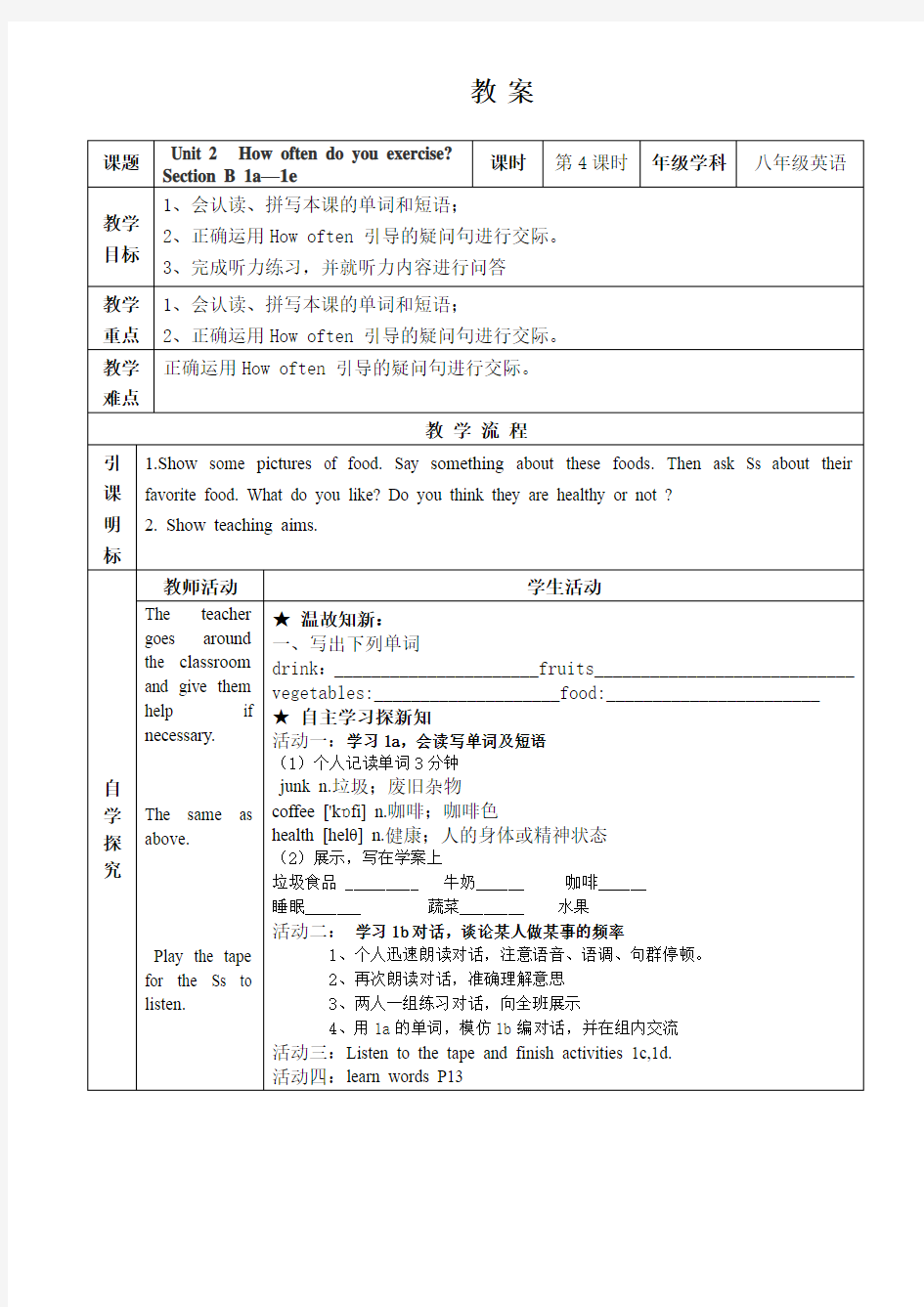unit2-How-often-do-you-exercise-SectionB教学案


教案
课题
Unit 2 How often do you exercise?
Section B 1a—1e
课时第4课时年级学科八年级英语
教学目标1、会认读、拼写本课的单词和短语;
2、正确运用How often 引导的疑问句进行交际。
3、完成听力练习,并就听力内容进行问答
教学重点1、会认读、拼写本课的单词和短语;
2、正确运用How often 引导的疑问句进行交际。
教学
难点
正确运用How often 引导的疑问句进行交际。
教学流程
引课明标1.Show some pictures of food. Say something about these foods. Then ask Ss about their favorite food. What do you like? Do you think they are healthy or not ?
2. Show teaching aims.
自学探究
教师活动学生活动
The teacher
goes around
the classroom
and give them
help if
necessary.
The same as
above.
Play the tape
for the Ss to
listen.
★温故知新:
一、写出下列单词
drink:______________________fruits____________________________
vegetables:____________________food:_______________________
★自主学习探新知
活动一:学习1a,会读写单词及短语
(1)个人记读单词3分钟
junk n.垃圾;废旧杂物
coffee ['k?fi] n.咖啡;咖啡色
health [helθ] n.健康;人的身体或精神状态
(2)展示,写在学案上
垃圾食品 _________ 牛奶______ 咖啡______
睡眠_______ 蔬菜________ 水果
活动二:学习1b对话,谈论某人做某事的频率
1、个人迅速朗读对话,注意语音、语调、句群停顿。
2、再次朗读对话,准确理解意思
3、两人一组练习对话,向全班展示
4、用1a的单词,模仿1b编对话,并在组内交流
活动三:Listen to the tape and finish activities 1c,1d.
活动四:learn words P13
精讲点拨
★知识超市
重点词组练习:
(1)want sb to do sth 想要某人做某事
My mother wants me to drink it.我妈妈想要我喝。
want to do sth. 想要做某事
Do you want to go to the movies with me?你想和我一起去看电影吗?
有很多动词后面用这种结构做动词的复合宾语:
ask sb. to do sth. 叫某人做某事
tell sb. to do sth. 告诉某人去做某事
help sb. (to) do sth. 帮助某人做某事
(2) be good/bad for 对----有好/坏处(3) health ------healthy 健康的be good for … 表示“对……有益(有好处)”n. adj.
其反义为:be bad for … 对……有害/无益
It?s good for us to do more reading.多读书对我们有好处。
Drinking milk is good for your health.喝牛奶对你的健康有益。
Reading English is good for studying English.对英语对学习英语有益/有帮助。Reading in bed is bad for your eyes.在床上读书对你的眼睛有害。
训练达标1、选择
1)__________do you drink coffee? -----Twice a day.
A.How many
B.How long
C. How soon
D. How often
2)My teacher wants me _________ hard.
A.study
B. studying
C. to study
D. studies
3)Eating fruit and vegetables _____________ our health.
A. is good to
B. is good
C.is good for
D.is well for
4)Miss Liu is very ________, because she exercises every day.
A. health
B. healthy
C. unhealthy
D. unhealth
5)Thank you for _______ me with my English.
A. help
B. to help
C.helping
6) _______ milk do you drink?
A. How many
B. How much
C.How often
D. How soon
7).Don?t read in bed. It?s bad ___ your eyes.
A. for
B.of
C. with
小结提升Words and phrases: junk, health ,coffee want sb. to do be good for ,be bad for Sentences : how often do you ......? How many + 可数名词复数do you ......?
板书设计
Unit 2 How often do you exercise?Section B 1a—1e
一、Words and phrases 二、sentence structure
junk, health ,coffee How often do you ......?
want sb. to do -How many + 可数名词复数do you ......? be good for ,be bad for
教学反思
课题Unit 2 How often do you exercise?
Section B 3a—self
课时第5课时年级学科八年级英语
教学目标知识目标:always, usually , often, sometimes , hardly , ever, never., once , twice , how often、three times a week、every day. twice a week
What do you usually do on weekends? I sometimes go to the beach.
How often do you eat vegetables? Every day.
Most students do homework every day.
能力目标: 会使用频率副词及短语;能描述课余时间的活动安排;
情感目标: 建议学生培养良好的学习和生活习惯
教学重点会使用频率副词及短语;能描述课余时间的活动安排;
频度副词:always, usually, often, sometimes, hardly和never的应用疑问词how的用法
教学难点
会使用频率副词及短语;能描述课余时间的活动安排;
频度副词:always, usually, often, sometimes, hardly和never的应用疑问词how的用法
教学流程
引课明标1.Introduce my hobbies and what I often do in my free time .Ask about Ss .
2. Show teaching aims.
自学探究
教师活动学生活动
The teacher
goes around
the classroom
and give them
help if
necessary.
The same as
above.
Play the tape
for the Ss to
listen.
★温故知新:
I 写出相应的頻度副词:、、、、
II操练
—How often do you eat vegetables? — Every day.
Activities How ofen
a. go to the movies Every day
b. watch TV Once a week
c. shop Twice a week
d. exercise Three times a week
e.read Once a week
Twice a week
★自主学习探新知
活动一:
朗读文段,特别注意以下单词的读音及含义;
writer ['ra?t?(r)] n.作者;作家dentist ['dent?st] n.牙科医生
magazine ['m?ɡ?zi?n] n.杂志however [ha?'ev?(r)] adv.然而;无论如何;
than [e?n] conj.比almost ['??lm??st] adv.几乎;差不多
none [n?n] pron.没有人;没有任何东西,毫无
less [les] adj.更少的;较少的
point [p??nt] n.看法;要点;重点;小数点;目标;分数
活动二: 1.再次朗读文段,弄懂大意并选词填空;2.检查答案;
3.再次大声朗读文段。
4.完成对自己的生活习惯的调查表No.4 on P16.
活动三:完成3b:
